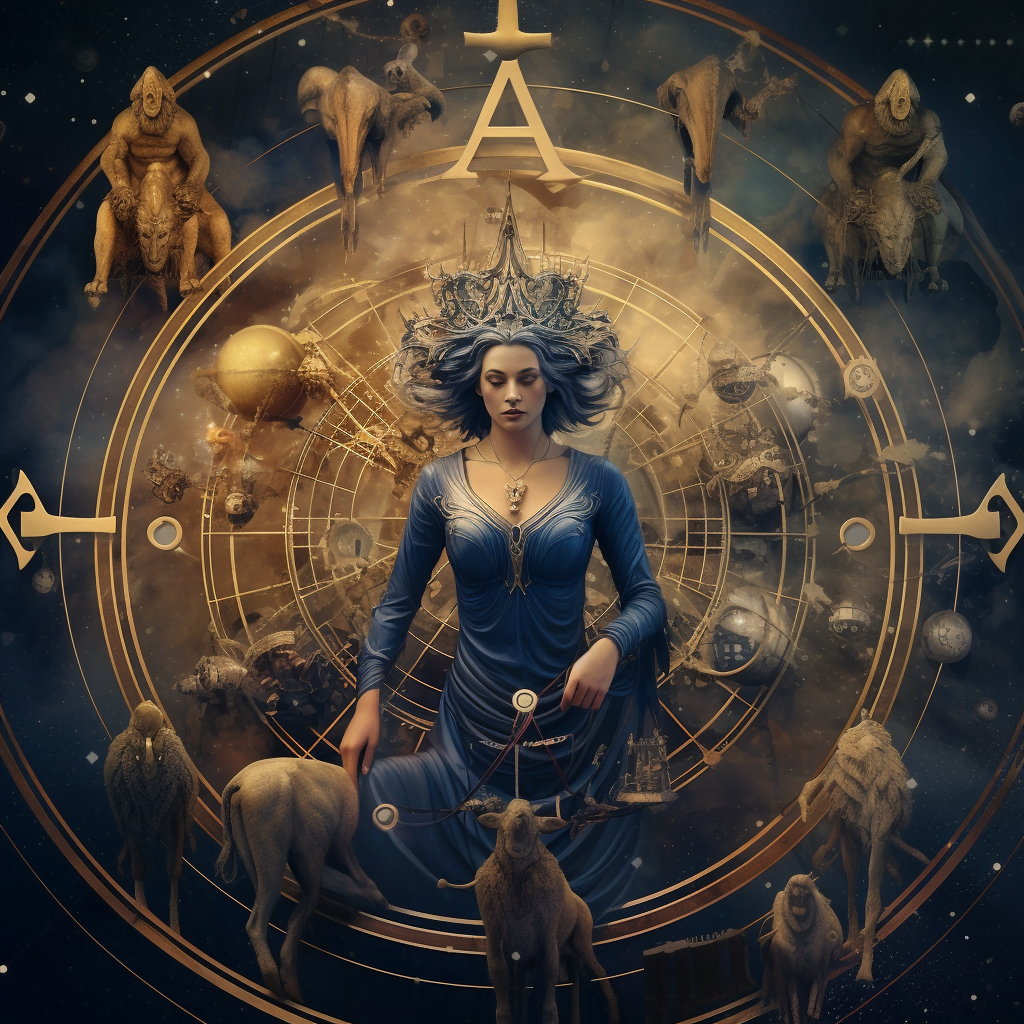I am compelled to explore the fascinating origins of the term “Zodiac” and uncover the mysterious individual responsible for its creation. By examining the realms of astrology and the Zodiac, I aim to shed light on the enigmatic origins of this age-old concept. With a curious mind and an academic lens, I delve into the depths of history, seeking the individual who bestowed this captivating name upon the celestial sphere. Who named Zodiac? The answer lies within the annals of time, waiting to be unveiled.
Introduction
The zodiac, often associated with astrology, is a celestial coordinate system that plays a significant role in various cultures and has been the subject of countless academic debates and discussions. Its origins can be traced back to ancient civilizations, where it served not only as a means to navigate the sky but also as a tool for understanding human behavior and predicting future events. Throughout history, the naming of the zodiac has undergone numerous transformations, influenced by different cultures, mythologies, and practices. This article aims to explore the origin, significance, and evolution of zodiac naming from an academic perspective, shedding light on its diverse cultural influences and the controversies it has sparked over time.
The Origin and Significance of Zodiac
Ancient Astrology and the Zodiac
Ancient astrology, rooted in the belief that celestial movements and positions had a direct impact on human affairs, laid the groundwork for the development of the zodiac. Early civilizations, such as the Mesopotamians and Egyptians, observed the sky and noticed patterns among the stars. They recognized that certain constellations appeared at specific times of the year and associated them with the changing seasons and agricultural cycles. These observations formed the basis of a celestial coordinate system that would later become known as the zodiac.
The Zodiac as a Celestial Coordinate System
The zodiac, consisting of twelve equal divisions along the ecliptic, serves as a fundamental celestial coordinate system. Each division corresponds to a specific constellation and is associated with a particular time of the year. The ecliptic, the apparent path of the Sun throughout the year, intersects the zodiac, allowing for the identification of the Sun’s position in relation to the constellations. This positioning is crucial for astrological interpretations and predictions, as it provides a frame of reference for locating celestial bodies in a chart and determining their significance in relation to an individual’s birth.
The Importance of Zodiac in Astrology
The zodiac is of paramount importance in astrology, as it serves as the foundation for constructing birth charts and interpreting astrological aspects. Each zodiac sign is believed to possess distinct qualities and characteristics that influence an individual’s personality traits, behaviors, and life experiences. Through the zodiac, astrologers can identify the position of celestial bodies at the time of a person’s birth, allowing for the creation of a comprehensive astrological profile. The zodiac acts as a symbolic language that astrologers use to understand and communicate the complexities of human existence.
The Naming of Zodiac
Historical Perspectives
The naming of the zodiac has a rich and complex history that spans cultures and civilizations. Understanding the various perspectives that have shaped the naming conventions is crucial for unraveling the intricacies of this celestial coordinate system. From the early civilizations of Mesopotamia and Egypt to the Greek and Roman eras, each culture’s contributions have left indelible marks on the zodiac’s naming and symbolism.
Mesopotamian Influence
Among the earliest contributors to the naming of the zodiac were the Mesopotamians, who developed a system of dividing the ecliptic into twelve equal parts, each associated with a specific constellation. Their names for these constellations often reflected agricultural or seasonal themes, as their society relied heavily on farming. For instance, Taurus, which represented the bull, embodied the importance of livestock in their culture. The Mesopotamians’ naming conventions laid the groundwork for future civilizations to build upon.
Greek Contributions
The Greeks, renowned for their contributions to various branches of knowledge, including astronomy and astrology, played a crucial role in shaping the naming of the zodiac. Through their influential texts, such as the works of Ptolemy, the Greeks introduced a more systematic approach to celestial observations and measurements. They further refined the zodiac’s naming by incorporating mythological elements and assigning specific characteristics to each constellation. This fusion of mythology and astronomy paved the way for subsequent cultures to interpret the zodiac through a mythological lens.
Hellenistic Astrology and the Zodiac
During the Hellenistic period, astrology experienced a significant surge in popularity, as new techniques and interpretations emerged. Hellenistic astrology, an amalgamation of Greek, Persian, and Egyptian traditions, introduced the concept of the “rising sign” or the constellation that appears on the Eastern horizon at the time of an individual’s birth. This innovation added another layer of complexity to the zodiac’s naming, as astrologers began to consider the influence of both the Sun and the rising sign in their analyses.
Roman Adaptation and Naming of the Zodiac
The Romans, influenced by their Greek predecessors, adopted and adapted much of Greek astrology and the zodiac’s naming conventions. However, they also brought their own cultural and religious influences to the table. The Romans associated the zodiac with their pantheon of gods and incorporated Roman mythology into the interpretation of each constellation. For example, Leo, representing the lion, was often associated with the hero Hercules. This synthesis of Greek and Roman traditions solidified the zodiac’s naming conventions and ensured its longevity throughout the centuries.
The Role of Astronomers in Naming Zodiac
Contributions from Arab and Persian Astronomers
The naming of the zodiac continued to evolve through the contributions of Arab and Persian astronomers during the Islamic Golden Age. Scholars such as Al-Kindi and Al-Biruni made significant advancements in astronomy and astrology, building upon the knowledge passed down from the Greeks and Romans. They translated and expanded upon ancient texts, further solidifying the zodiac’s naming conventions in the Arab and Persian world. Their contributions not only preserved the knowledge of the zodiac but also extended its reach to new regions and cultures.
European Astronomers’ Influence
During the Renaissance and Enlightenment eras, European astronomers made substantial contributions to the naming and understanding of the zodiac. Figures like Nicolaus Copernicus and Johannes Kepler revolutionized our understanding of the cosmos through their groundbreaking discoveries. Their scientific advancements provided new perspectives on the zodiac, leading to a more accurate understanding of celestial movements and the Earth’s position in the solar system. These developments had a profound impact on astrology and the zodiac’s naming conventions, aligning it more closely with scientific principles.
Modern Standardization and Naming of Zodiac
In modern times, the International Astronomical Union (IAU) plays a crucial role in standardizing astronomical nomenclature, including the naming of the zodiac. The IAU establishes guidelines and protocols for naming celestial bodies and features, ensuring consistency and accuracy in scientific discourse. Although the zodiac’s naming conventions are largely based on historical traditions, the IAU’s involvement ensures that contemporary astronomical discoveries and observations are integrated into the ongoing evolution of the zodiac’s naming.
The Impact of Cultural Influences on Zodiac Naming
Varying Zodiac Names in Different Cultures
Beyond the Greek and Roman traditions, different cultures and civilizations have developed their own unique names for the zodiac constellations. In Chinese astrology, for example, the zodiac is based on twelve animal signs that rotate on a twelve-year cycle. Each animal sign is associated with specific characteristics and attributes, shaping the interpretation of an individual’s personality and destiny. Similarly, the Indian zodiac, known as the “Rashi” system, consists of twelve signs based on the positions of the Moon during an individual’s birth. Each sign has distinct qualities and influences on a person’s life.
Chinese Zodiac and its Naming Tradition
The Chinese zodiac’s naming convention is deeply rooted in Chinese mythology and folklore. According to legend, the Jade Emperor invited animals to attend a heavenly gathering, and the order in which they arrived determined their position in the zodiac. Each animal sign is associated with particular traits and is believed to influence a person’s life depending on their birth year. The Chinese zodiac’s naming tradition reflects the cultural significance of animals in Chinese society and adds a unique perspective to the understanding of zodiac symbolism.
Indian Zodiac and its Unique Names
In the Indian zodiac, each sign is named after a Hindu deity or mythological figure and is believed to represent specific qualities and characteristics. For example, Aries is called “Mesha” and is associated with Agni, the god of fire, representing strength and passion. The Indian zodiac’s naming convention not only draws from Hindu mythology but also considers the influence of the Moon, as each sign corresponds to a specific lunar mansion. This interplay of mythology and lunar positions adds depth and nuance to the interpretation of the zodiac in the Indian astrological tradition.
Native American Zodiac and its Cultural Significance
Native American cultures also have their own zodiac systems, often influenced by the natural world and the local environment. For instance, the Lakota Sioux zodiac includes twelve signs based on the behaviors and characteristics of local animals, such as the bear, hawk, and coyote. Each sign embodies specific qualities and is believed to impact an individual’s life depending on their birth date. The Native American zodiac’s naming convention reflects the deep connection between indigenous cultures and their surrounding ecosystems, providing a unique cultural lens through which to interpret the zodiac.
Controversies and Disputes surrounding Zodiac Naming
Conflicts in the Translation of Ancient Texts
One of the major controversies surrounding zodiac naming is the accurate translation and interpretation of ancient texts. As the zodiac’s origins date back to ancient civilizations, the original meanings and intentions behind the naming of constellations can be subject to interpretation. Different translations and scholarly perspectives can lead to conflicting claims and disputes, further complicating the understanding of the zodiac and its symbolic references. Scholars and astrologers continue to grapple with these challenges, aiming to reconcile discrepancies and arrive at a more comprehensive understanding of the zodiac’s naming conventions.
Competing Claims and Traditions
Due to the deep cultural significance and historical roots of zodiac naming, competing claims and traditions have emerged over time. Cultures and astrological schools may have their own interpretations and naming conventions, which can sometimes clash with others. These competing claims can lead to disputes and disagreements, particularly when attempting to create a universal standard for zodiac naming. Balancing cultural diversity with the need for consistency and clarity remains an ongoing challenge in the realm of astrology.
Modern Challenges with Zodiac Naming
In the modern era, the proliferation of information and globalization has both facilitated and complicated the understanding and naming of the zodiac. With the internet serving as a platform for disseminating knowledge, diverse perspectives and interpretations of the zodiac are readily accessible to a wide audience. This influx of information can sometimes create confusion and debate, as individuals encounter conflicting information and varied naming conventions. The challenge lies in discerning reputable sources and navigating through the plethora of perspectives to arrive at a coherent understanding of the zodiac’s naming.
The Role of Mythology in Zodiac Naming
Mythological Figures and their Associations with Zodiac
Mythology has played a pivotal role in shaping the naming of the zodiac constellations. Various mythological figures and narratives have been associated with specific constellations, adding depth and symbolism to their interpretations. For example, the constellation Orion is often associated with the legendary hunter in Greek mythology, known for his bravery and prowess. These mythological associations provide a framework for understanding and interpreting the zodiac through the lens of ancient stories and archetypes.
Greek and Roman Gods in Zodiac Naming
In the Greek and Roman traditions, gods and goddesses were often linked to specific zodiac constellations, infusing the zodiac with divine symbolism. For instance, the constellation Pisces is associated with Aphrodite (Venus) and Eros (Cupid) in Greek mythology. This connection suggests themes of love, compassion, and emotional depth. By associating gods and goddesses with the zodiac, ancient cultures aimed to establish a connection between the divine realm and human existence, adding another layer of significance to the zodiac’s naming.
Zodiac Symbols and their Mythological Origins
The symbols associated with the zodiac signs also draw upon mythological origins. Each zodiac sign is represented by a specific symbol, such as the ram for Aries or the scales for Libra. These symbols often find their roots in mythological narratives and are imbued with meaning and symbolism. For example, the scales of Libra are associated with the goddess Astraea, who was said to have been the last immortal to leave Earth, symbolizing justice and balance. These mythological origins contribute to the rich tapestry of symbolism within the zodiac.
The Influence of Astrology Schools and Practices on Zodiac Naming
Ancient Astrological Texts and Naming Conventions
Throughout history, various astrological schools and practices have emerged, each contributing to the understanding and naming of the zodiac. Ancient astrological texts, such as the works of Ptolemy, provided foundational knowledge and named conventions that have endured to this day. These texts often included detailed descriptions and interpretations of each zodiac sign, establishing a framework for astrologers to follow. The influence of these ancient texts is still evident in contemporary astrology, as they continue to inform the naming and interpretation of the zodiac.
Medieval and Renaissance Astrology Schools
During the Middle Ages and Renaissance periods, astrology experienced a resurgence in popularity and underwent further development. Astrological schools, such as the Persian School and the Arabic School, contributed to the refinement of astrological techniques and interpretations. The naming of the zodiac within these schools often drew upon earlier traditions but incorporated new perspectives and insights. Figures like Abu Ma’shar al-Balkhi and Guido Bonatti left a lasting impact on the evolution of the zodiac’s naming conventions during this era.
Modern Astrology and Zodiac Naming
In modern astrology, which emerged in the late 19th and early 20th centuries, astrologers continue to draw upon historical naming conventions while incorporating contemporary insights and perspectives. Modern astrology encompasses a wide range of approaches and practices, each with its own naming conventions and interpretations of the zodiac. Astrologers today navigate the balance between tradition and innovation, seeking to honor the rich history of zodiac naming while adapting it to the complexities of the modern world.
Evolution and Changes in Zodiac Naming over Time
Adjustments and Additions to Zodiac in Ancient Times
Over the course of history, the zodiac’s naming has undergone adjustments and additions influenced by cultural, scientific, and mythological factors. Civilizations such as the Babylonians and Assyrians introduced changes to the zodiac, as did the Greeks and Romans, incorporating their cultural and religious beliefs into the naming of constellations. The zodiac evolved as new civilizations adopted and adapted it, adding layers of meaning and symbolism to the already complex system.
The Role of Renaissance and Enlightenment in Zodiac Names
The Renaissance and Enlightenment periods were pivotal in our understanding of the cosmos and the naming conventions of the zodiac. Renaissance astronomers began to reject traditional belief systems in favor of scientific inquiry and empirical observation. Figures like Copernicus and Kepler challenged existing notions and revolutionized our understanding of celestial bodies. These scientific advancements had a direct impact on the naming of the zodiac, aligning it more closely with astronomical principles and shedding light on the true nature of the constellations.
Modern Amendments and Revisions in Zodiac Naming
In contemporary times, the naming of the zodiac has continued to evolve, influenced by a multitude of factors. Amendments and revisions to the zodiac’s naming have occurred in response to scientific discoveries, advancements in cultural understanding, and the need for standardized nomenclature. The International Astronomical Union, as mentioned earlier, plays a significant role in maintaining consistency and accuracy in naming celestial bodies, ensuring that new discoveries and observations are integrated into the ever-evolving zodiac.
Conclusion
The naming of the zodiac is a testament to the rich tapestry of human history, culture, and scientific exploration. From its ancient origins in diverse civilizations to its modern standardization and adaptation, the zodiac’s naming has been shaped by a multitude of influences. Cultural traditions, mythologies, scientific advancements, and astrological practices have all contributed to the evolution of the zodiac’s naming over time. As we continue to explore the complexities of astrology and the zodiac, it is essential to appreciate the diverse perspectives and controversies that have accompanied its naming, creating a fascinating mosaic of celestial symbolism and human interpretation.



